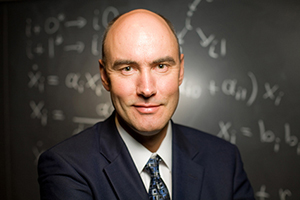Martin Nowak, Director Program for Evolutionary Dynamics, Harvard University
Le mercredi 6 novembre 2013 • 19h30
Wednesday, November 6, 2013 • 7:30 pm
LIEU/VENUE :
Université de Montréal
Pavillon Jean-Coutu
2940, chemin de Polytechnique
salle S1-151
The Evolution of Cooperation: Why We Need Each Other to Succeed
Résumé/Abstract : During his upcoming Public Lecture, evolutionary biologist Martin Nowak, author of the best-selling book SuperCooperators, will share his cutting-edge research on the mysteries of cooperation. According to Nowak, many problems that challenge us today can be traced back to a tension between what is good and desirable for society as a whole and what is good and desirable for an individual. This conflict is illustrated in global problems such as climate change, pollution, hunger, and overpopulation. Nowak argues that cooperation—not competition—is the key to the evolution of complexity.
La conférence sera suivie d'un vin d'honneur à l'Agora Goodman. / A vin d'honneur will follow the lecture.
Biography: Martin A. Nowak is Professor of Biology and Mathematics at Harvard University and Director of the Program for Evolutionary Dynamics. He works on the mathematical description of evolutionary processes, including the evolution of cooperation and human language, as well as the dynamics of virus infections and human cancer. His major scientific contributions and discoveries include: the mechanism of HIV disease progression; the rapid turnover and evolution of drug resistance in HIV infection; quantifying the dynamics of HBV infection; the evolution of virulence under superinfection and coinfection; the role of chromosomal instability in human cancer; quantifying the dynamics of chronic myeloid leukemia; the accumulation of drivers and passengers in cancer progression; the evolution of drug resistance in targeted cancer therapy; the mechanisms for the evolution of genetic redundancy; "generous tit-for-tat" and "win-stay, lose-shift"; the alternating Prisoner's Dilemma; the evolution of cooperation by indirect reciprocity; spatial game dynamics; adaptive dynamics; evolutionary game dynamics in finite populations; evolutionary graph theory; the five mechanisms for the evolution of cooperation; the evolution of eusociality by natural selection; a mathematical approach for studying the evolution of human language; the dynamics of language regularization; culturomics; "winners don't punish"; prelife; and the origin of evolution. an Aisenstadt Lecturer for the Thematic Semester in Biodiversity and Evolution.

